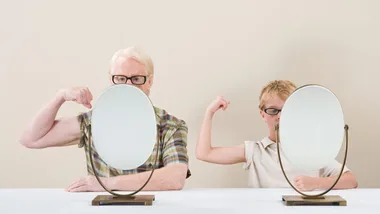Few mishaps are as jolting as the indignity of a fall. One minute it’s business as usual, the next you’re on the ground and left wondering what just occurred. Accidents can happen to anyone, but taking a tumble is more of a worry after the age of 50, when your risk of osteoporosis rises.
“Osteoporosis is a condition in which bones become fragile, leading to a higher risk of fractures or breaks,” says Professor Peter Ebeling, medical director at Osteoporosis Australia, which estimates that 4.7 million Australians over 50 have osteoporosis or osteopenia (low bone density).
“They occur when your bones lose minerals, such as calcium, faster than the body can replace them, leading to bones becoming so porous that even a minor bump can result in a fracture,” Professor Ebeling says.
“One of the major challenges is that people often don’t realise they’ve got osteoporosis until they break a bone.”
You can, however, still build stronger bones – and here’s how.
Bone health in your 50s
WHAT’S GOING ON
Women in their fifties are at risk of bone loss, as the reduction of oestrogen that typically occurs during menopause is one of the strongest risk factors for developing osteoporosis. “With the loss of oestrogen support, bone breakdown increases, which means bone loss occurs and increases the chance of breaking bones,” Professor Ebeling says.
REVIEW YOUR HEALTH
“In Australia, only 20 per cent of people with broken bones due to osteoporosis are being treated or investigated for it,” he adds, suggesting talking to your GP about ways to lower the odds. “Maybe you’ve already had a broken bone, your mum fractured her hip, or perhaps you used to smoke or drink more than two serves of alcohol a day. Whatever the situation, it’s possible to shift your risk of osteoporosis if you know your bone status,” he says.
Ask your GP about having a baseline bone density scan, a simple test that measures the amount of bone mineral in bone tissue to provide an indication of how strong they are.
STAY ACTIVE
“If you were physically active throughout your life, you’ll now notice how much it will help you maintain your bone density, particularly in the hip area. But even if exercise wasn’t your thing, you can still start at any time,” Professor Ebeling says. Aim for at least 30 minutes of moderate to high-impact weight-bearing exercise three days a week. “Resistance training, such as lifting weights, is also wise,” he suggests.
BOOST YOUR DIET
Engaging in healthy eating habits now may protect you from developing osteoporosis later in your life. “In your fifties, have at least three serves of calcium-containing foods per day,” Professor Ebeling says.
To help you reach the recommended daily intake of calcium of 1300mg, eat a mix of dairy foods, fish, legumes and nuts, as well as fortified soy drinks and breakfast cereals.
*155,000: The number of fractures expected to occur in Australia in 2017 as a result of poor bone health.
Bone health in your 60s
WHAT’S GOING ON
Bone deterioration continues in your sixties, but at a slower rate than during menopause.
“While the rapid phase of bone loss associated with menopause has ended, a more gradual bone loss is occurring, so preventative strategies still apply,” Professor Ebeling says.
General wear and tear on joints may cause osteoarthritis at this time.
REVIEW YOUR HEALTH
People joke about starting to shrink around this time, but the fact is you should have your height measured once a year.
“While it’s normal to shrink a little, a reduction in height of 3cm or more could be a sign of something serious, so it’s recommended to do a scan in this instance,” Professor Ebeling explains. “It could be that the discs between the spinal bones are getting thinner, or that the bones themselves have collapsed.”
STAY ACTIVE
Continue exercising three times a week. “The best forms of high-impact exercise for bone health include jogging and tennis,” Professor Ebeling says. If you’re not that sporty, make sure you’re still getting up and about, taking the stairs when you can. It’s also a good idea to see your GP for back-strengthening exercises to lower your risk of spinal fractures.
BOOST YOUR DIET
Women 60-plus require three serves of calcium-rich foods to maintain the recommended 1300mg a day. If you fall short, consider taking a supplement, and eat lean protein at each meal, because a diet that’s lacking in either calcium or protein is associated with a greater loss of bone mass.
Bone health in your 70s
WHAT’S GOING ON
A loss of muscle mass during this decade leads to reduced strength and impaired reflexes as well as a greater risk of broken bones.
“In addition to physically slowing down, it’s common to notice sensory changes and develop other medical conditions, such as peripheral neuropathy, which can further increase the risk of falls,” Professor Ebeling says.
REVIEW YOUR HEALTH
Whether or not you’ve previously broken a bone, see your GP to discuss fracture prevention. Ask to have your vitamin D levels tested and for a review of your existing medical conditions, lifestyle habits and regular medications, both over-the-counter and prescription.
“Some steroids, antidepressants and anti-reflux medications can affect bone health, but other medications can reverse the effects of these drugs,” Professor Ebeling advises.
STAY ACTIVE
“While brisk walking is excellent, it isn’t enough on its own,” Professor Ebeling says. “You also need to do weight-bearing exercises and activities that challenge you.”
BOOST YOUR DIET
Eating a balanced diet that includes plenty of protein, fruits and vegetables is absolutely vital in your seventies.
“Stay away from processed foods, and if you can’t achieve the recommended 1300mg of calcium a day, take a supplement,” Professor Ebeling suggests. Also consider mixing protein powders into smoothies and soups. He says, “Getting enough protein is important, because often as people get older their general nutrition can become poor, which will affect bone health.”


